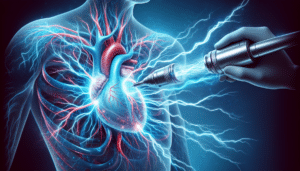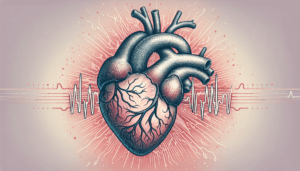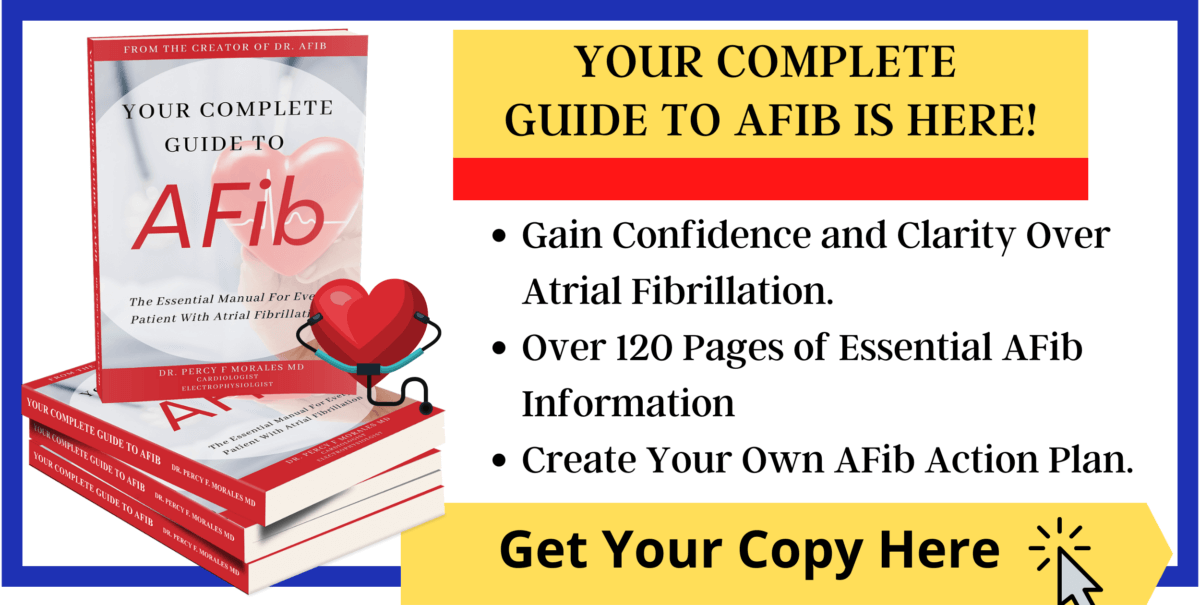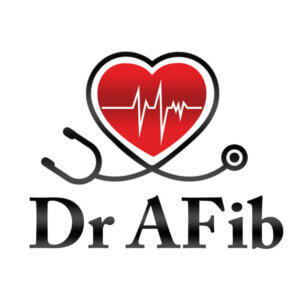Can AFib be cured? As the most common heart arrhythmia in the world, it is no surprise that many of my newly diagnosed patients frequently ask me, “can atrial fibrillation be cured?”
To better understand the answer to this question, we first must define the meaning of “cure.” For myself, my personal definition of a cure for atrial fibrillation is that the disease would be completely eradicated by a procedure, medication, or a lifestyle modification that leaves the patient with zero episodes of AFib for the rest of their life with absolutely no residual symptoms.
And while this sounds like a fantastic option, is this definition of a cure achievable with our current treatment options?
Unfortunately, the answer is no. And while this may be quite demoralizing news for many of my patients, it is important to note that just because AFib cannot be 100% cured, it doesn’t mean that it can’t be reversed or managed incredibly well with modern treatment options and natural lifestyle modifications.
Current Treatment Options For Atrial Fibrillation
Depending on a patient’s health history, lifestyle choices, and severity of their AFib symptoms, different treatment options may be better suited to manage their atrial fibrillation. Common medical treatment options for AFib include:
-
Electrical Cardioversion — Using electrical shocks from outside the body, having a cardioversion performed can help return the heart from AFib to a normal rhythm. This is typically performed in people who have persistent atrial fibrillation, defined as an episode of atrial fibrillation that lasts more than 7 days. Read more about a cardioversion procedure here.
-
Medications — Depending on the patient’s needs, various medications are used to control their AFib symptoms better. Ranging from beta blockers, to anti-arrhythmic medications, to blood thinners to reduce the risk of stroke, each patient will be prescribed medications that best fit their unique health needs.
-
Catheter Ablations — Using a small catheter that is inserted into the heart from a peripheral vein, a catheter ablation strategically destroys some of the heart tissue responsible for causing AFib. If successful, this can help patients manage their symptoms for a prolonged period of time with less medications. Read more about catheter ablation procedures here.
-
Pacemakers — In some patients with AFib, implanted pacemakers can help to better control their heart rhythm. Pacemakers can help control symptoms of AFib as well as help patients better tolerate medications typically used for atrial fibrillation.
-
Surgical Ablation Procedures — For patients with severe AFib or for those who are not candidates for other treatment options, surgical ablation procedures such as a maze, mini-maze, or hybrid surgery can improve symptoms of AFib. Read more about surgical AFib ablation options here.
-
Lifestyle modifications – Lifestyle modifications such as weight loss, reducing alcohol consumption, and treatment of sleep related disorders can significantly reduce symptoms of AFib.
Can Atrial Fibrillation Be Cured Permanently?
So, understanding the current treatment options available, it is clear that atrial fibrillation cannot be 100% cured. While available treatments can significantly improve a person’s symptoms, the number of AFib episodes a patient will experience after treatment will never be zero, and residual symptoms of AFib may or may not still be present. Long-term treatment and monitoring are essential for long-term results.
Atrial Fibrillation CAN Be Reversed
While atrial fibrillation is unfortunately not 100% curable at this point in time, this does not undermine the value of atrial fibrillation treatment. With the help of modern treatment options and a commitment to natural lifestyle modifications, many of my patients have been able to see a significant reduction in the frequency and severity of their AFib symptoms. In patients who are compliant with their treatment plans, many can live their life to the fullest, experiencing minimal to no symptoms or episodes of atrial fibrillation.
So while no treatment option is 100% effective, routine monitoring, modern medical treatments, and a commitment to healthier lifestyle habits can all play a significant role in reversing and reducing the severity of a patient’s atrial fibrillation for long-term benefits.
Frequently Asked Questions About Curing AFib:
Can AFib Correct Itself?
For patients newly diagnosed with atrial fibrillation, it can often feel like episodes of AFib can come and go at any time. While it is possible for the heart to correct itself in the short term (i.e., to correct the heart rhythm enough to stop an AFib episode), it is unlikely that the heart would be able to correct itself in the long term if nothing is done to treat AFib.
The natural course of atrial fibrillation is that episodes of AFib will get more frequent, then episodes will last longer, and then eventually a person will develop persistent atrial fibrillation. Once this occurs, the patient will require more invasive medical interventions to help them reduce their symptoms and better manage their disease.
Early treatment and lifestyle modifications are essential to achieve the best long-term treatment results.
What is a Heart Catheter Ablation Success Rate?
As I mentioned above, catheter ablation procedures can make a dramatic improvement in someone’s atrial fibrillation, but they are never a 100% cure. To better understand the success rates of catheter ablation, we first must understand the different stages of AFib:
-
Paroxysmal atrial fibrillation — The early stage of the disease, where a patient experiences episodes of AFib symptoms in between periods of no disease. In this phase, the success rate of a catheter ablation is between 60-80%.
-
Persistent atrial fibrillation — As the later stage of the disease, patients in persistent atrial fibrillation experience constant symptoms and episodes of AFib. In this phase, the success rate for a catheter ablation is lower, at around 50-60%.
In both of these cases, a patient’s treatment success rate, including a catheter ablation, can be improved by implementing natural lifestyle modifications to reduce the severity of their disease.
Is There a Natural Cure for AFib?
When most people think of natural treatment options, they are assuming that they can take a natural supplement that will cure or reverse atrial fibrillation. This type of natural treatment is not a successful way to manage AFib. Real natural treatment for AFib requires lifestyle modifications and commitment.
Real natural treatment options refer to lifestyle modifications that can help slow the progression of the disease, while also reducing the severity of a patient’s existing symptoms, as well as potentially reversing the disease process. Proven by an abundance of scientific research, some examples of lifestyle changes that can improve AFib symptoms include:
-
Weight loss
-
Decreasing alcohol intake
-
Participating in daily exercise
-
Eating a balanced and nutritious diet
-
Reducing sources of chronic stress
-
Improving sleep quality
While none of these lifestyle changes are a “cure” for AFib, implementing them into your daily routine is one of the best ways to reverse and manage your current AFib symptoms for the best long-term success.
How To Reverse Atrial Fibrillation Naturally
If you are interested in natural treatment options for atrial fibrillation and are highly motivated in improving your symptoms naturally, to reduce your need for medications or even procedures, then take a look at my one-of-a-kind, online educational program, Take Control Over AFib.
Lifestyle modifications and reducing inflammation are essential components of the long-term management of atrial fibrillation. Addressing the source cause of atrial fibrillation can lead to a significant benefit for most AFib patients. Targeted lifestyle modifications can reduce your symptoms, reduce your reliance on medications or procedures, and even improve the long-term success rate of a catheter ablation procedure for AFib. However, most patients are not given instructions or tips on how to accomplish these essential lifestyle modifications in an AFib targeted style.
This is exactly why I created the Take Control Over AFib Program, to give people a step-by-step plan to improve and potentially reverse atrial fibrillation naturally.
Thinking about lifestyle modifications is easy, but putting in place a system to keep you committed to achieve real results takes time and dedication, and with my step-by-step plan, we can achieve powerful and long-lasting results together.
The Take Control Over AFib Online Program is currently only available in English Language.
Learn More About The Take Control Over AFib Program Here
Putting It All Together
Unfortunately, there is no definitive cure for atrial fibrillation. But, with that being said, there are many high-quality medical and lifestyle treatment options available for anyone looking to improve the management of their disease.
Like in many things, combining treatment strategies by combining modern medical options with lifestyle modifications is the best way to reverse your current AFib symptoms and live a healthier and happier life.
The Best Atrial Fibrillation Book
Your Complete Guide To AFib: The Essential Manual For Every Patient With Atrial Fibrillation

Shop AFib Products on Amazon
KardiaMobile 6-Lead Personal EKG Monitor – Six Views of The Heart – Detects AFib and Irregular Arrhythmias – Instant Results in 30 Seconds – Works with Most Smartphones - FSA/HSA Eligible
13% Off
KardiaMobile 1-Lead Personal EKG Monitor – Record EKGs at Home – Detects AFib and Irregular Arrhythmias – Instant Results in 30 Seconds – Easy to Use – Works with Most Smartphones - FSA/HSA Eligible
$79.00 (as of June 5, 2025 06:30 GMT -06:00 - More infoProduct prices and availability are accurate as of the date/time indicated and are subject to change. Any price and availability information displayed on [relevant Amazon Site(s), as applicable] at the time of purchase will apply to the purchase of this product.)
Apple Watch Series 9 [GPS 41mm] Smartwatch with Storm Blue Aluminum Case with Silver Sport Band M/L. Fitness Tracker, Blood Oxygen & ECG Apps, Always-On Retina Display
(as of June 5, 2025 07:43 GMT -06:00 - More infoProduct prices and availability are accurate as of the date/time indicated and are subject to change. Any price and availability information displayed on [relevant Amazon Site(s), as applicable] at the time of purchase will apply to the purchase of this product.)
Fitbit Sense 2 Advanced Health and Fitness Smartwatch with Tools to Manage Stress and Sleep, ECG App, SpO2, 24/7 Heart Rate and GPS, Shadow Grey/Graphite, One Size (S & L Bands Included)
20% Off
OMRON 2-in-1 Upper Arm Blood Pressure Monitor & 1-Lead EKG Monitor - Clinically Validated Blood Pressure Arm Cuff & Machine - Use OMRON Connect App
17% Off
Samsung Galaxy Watch 6 44mm Bluetooth Smartwatch, Fitness Tracker, Personalized HR Zones, Advanced Sleep Coaching, Heart Monitor, BIA Sensor, Health Wellness Insights, Big Screen, US Version, Graphite
52% Off $329.99 (as of June 5, 2025 06:30 GMT -06:00 - More infoProduct prices and availability are accurate as of the date/time indicated and are subject to change. Any price and availability information displayed on [relevant Amazon Site(s), as applicable] at the time of purchase will apply to the purchase of this product.)
Natural Rhythm Triple Calm Magnesium 150 mg - 120 Capsules – Magnesium Complex Compound Supplement with Magnesium Glycinate, Malate, and Taurate. Calming Blend for Promoting Rest and Relaxation.
$20.77 ($0.17 / Count) (as of June 5, 2025 06:30 GMT -06:00 - More infoProduct prices and availability are accurate as of the date/time indicated and are subject to change. Any price and availability information displayed on [relevant Amazon Site(s), as applicable] at the time of purchase will apply to the purchase of this product.)
Pure Encapsulations Magnesium (Glycinate) - Supplement to Support Stress Relief, Sleep, Heart Health, Nerves, Muscles, and Metabolism* - with Magnesium Glycinate - 180 Capsules
$44.60 ($0.25 / Count) (as of June 5, 2025 07:43 GMT -06:00 - More infoProduct prices and availability are accurate as of the date/time indicated and are subject to change. Any price and availability information displayed on [relevant Amazon Site(s), as applicable] at the time of purchase will apply to the purchase of this product.)
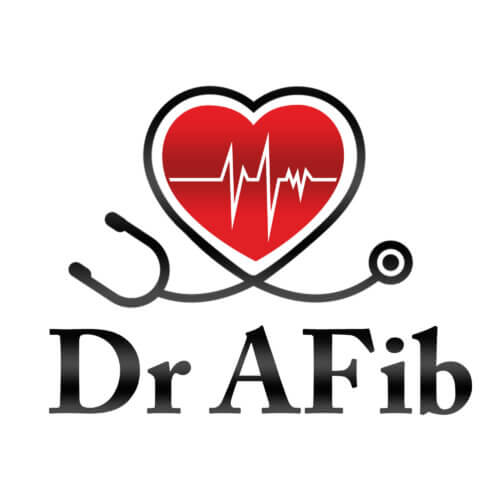














![Apple Watch Series 9 [GPS 41mm] Smartwatch with Storm Blue Aluminum Case with Silver Sport Band M/L. Fitness Tracker, Blood Oxygen & ECG Apps, Always-On Retina Display #1](https://m.media-amazon.com/images/I/311xwtp4mFL._SL100_.jpg)
![Apple Watch Series 9 [GPS 41mm] Smartwatch with Storm Blue Aluminum Case with Silver Sport Band M/L. Fitness Tracker, Blood Oxygen & ECG Apps, Always-On Retina Display #2](https://m.media-amazon.com/images/I/41j+8AaUGsL._SL100_.jpg)
![Apple Watch Series 9 [GPS 41mm] Smartwatch with Storm Blue Aluminum Case with Silver Sport Band M/L. Fitness Tracker, Blood Oxygen & ECG Apps, Always-On Retina Display #3](https://m.media-amazon.com/images/I/41jIyxZitnL._SL100_.jpg)
![Apple Watch Series 9 [GPS 41mm] Smartwatch with Storm Blue Aluminum Case with Silver Sport Band M/L. Fitness Tracker, Blood Oxygen & ECG Apps, Always-On Retina Display #4](https://m.media-amazon.com/images/I/41IpNJERjCL._SL100_.jpg)
![Apple Watch Series 9 [GPS 41mm] Smartwatch with Storm Blue Aluminum Case with Silver Sport Band M/L. Fitness Tracker, Blood Oxygen & ECG Apps, Always-On Retina Display #5](https://m.media-amazon.com/images/I/31o17yhfYpL._SL100_.jpg)
































